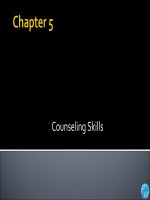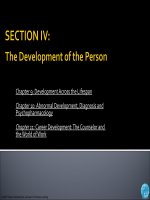The world of the counselor an introduction to the counseling profession 4th edition neukrug test bank
Bạn đang xem bản rút gọn của tài liệu. Xem và tải ngay bản đầy đủ của tài liệu tại đây (312.83 KB, 6 trang )
Chapter 2
Test Bank
1. In earlier times, __________, or individuals who had special status due to their mystical
powers were considered caretakers of the soul.
a. Knights
b. Shamans
c. Healers
d. Kings
Answer B
page 34
2. _______________ presented reflections on the human condition that were to greatly
change the Western world’s view of the person.
a. Socrates
b. Mohammed
c. Hippocrates
d. Buddha
Answer C
page 34
3. One of the best known settlement houses was ______________ House, established by
social activist Jane Adams.
a. Hill
b. Hull
c. Hall
d. Heil
Answer B
Page 37
4. During the 1940s and 1950s an increased emphasis on understanding the dynamics of
social and family ____________ emerged.
a. Cases
b. Practices
c. Methods
d. Systems
Answer D Page 36
5. The NASW (National Association of Social Work) was created in:
a. 1955
b. 1965
c. 1975
d. 1985
Answer A
Page 36
6. _________ was considered the first psychologist because he used objectivity and reason
to study knowledge and his writings were psychological in nature.
a. Hippocrates
b. Socrates
c. Aristotle
d. Augustine
Answer C page 37
7. _______________ and Sir Francis Galton developed laboratories to examine similarities
and differences in responses by individuals to sensory experiments as they attempted to
understand how responses to external stimuli we related to the mind.
a. Freud
b. Wundt
c. Cattell
d. James
Answer B page 38
8. __________ views on mental health and mental illness were revolutionary.
a. Freud’s
b. James’
c. Wundt’s
d. Pavlov’s
Answer A
page 38
9. In 1892 the American _______________ Association was founded as an association
mostly of experimental psychologists.
a. Physician’s
b. Psychological
c. Psychologists
d. Psychiatrists
Answer B Page 40
10. The field of ____________ has affected the counseling profession more than any other
related mental health profession.
a. Social Work
b. Guidance
c. Psychology
d. Psychiatry
Answer C Page 41
11. ____________ is considered the founder of American psychology.
a. Pinel
b. Freud
c. Rush
d. James
Answer C Page 42
12. During the _____________ there was a great expansion of the use of psychotropic
medications.
a. 1920’s
b. 1950’s
c. 1930’s
d. 1940’s
Answer B Page 43
13. The purpose of the ________is to provide uniform criteria for making clinical diagnoses
thereby enhancing agreement among clinicians.
a. Diagnostic and Statistical Manual of Emotional Disorders
b. Diagnostic and Statistical Manual of Psychological Disorders
c. Diagnostic and Statistical Manual of Mental Disorders
d. Diagnostic and Statistical Manual of Physical Disorders
Answer C Page 44
14. Paralleling the rise of the vocational guidance movement was the _____________
movement.
a. Testing
b. Guidance
c. Counseling
d. Reform
Answer A
Page 46
15. _________ theory ushered in a new way of thinking about the development of a person.
a. Jung’s
b. Cattell’s
c. Freud’s
d. Pinel’s
Answer C
Page 47
16. The founder of guidance in America was ___________________.
a. Sigmund Freud
b. Frank Parsons
c. Carl Jung
d. Jane Adams
Answer B Page 49
17. Vocational Guidance was first used in ________________.
a. Hospitals
b. Mental institutions
c. Prisons
d. Schools
Answer D Page 43
18. During World War I some of the first crude tests of _________ were used on a large
scale basis.
a. Mental status
b. Ability
c. Intelligence
d. Achievement
Answer B
Page 44
19. In 1908 Clifford Beers, a Yale graduate who had been hospitalized for years due to
schizophrenia wrote ____________________________.
a. A Beautiful Mind
b. A Trip through Time
c. A Mind that Found Itself
d. The DSM
Answer C Page 46
20. E. G. Williamson developed what is considered the first comprehensive theory of
counseling in the ____________.
a. 1930s
b. 1940s
c. 1950s
d. 1960s
Answer A
Page 46
21. The Trait and Factor Approach included five steps that were:
a. Analysis, Synthesis, Counseling, Diagnosis, Follow Up
b. Analysis, Synthesis, Diagnosis, Counseling, Follow Up
c. Diagnosis, Synthesis, Analysis, Counseling, Follow Up
d. Analysis, Diagnosis, Synthesis, Counseling, Follow Up
Answer B pg 47
22. ______________ was a humanistic psychologist who had a dynamic impact on the field
of counseling in the first half of the twentieth century.
a. Freud
b. Pinel
c. Jung
d. Rogers
Answer D
Page 47
23. There was a dramatic increase in school counselors in the __________ due to the
passing of federal legislation the National Defense Education Act.
a. 1920s
b. 1930s
c. 1940s
d. 1950s
Answer D
Page 47
24. The 1960s were a decade of expansion, acceptance and diversification of the counseling
profession largely as the result of ___________________.
a. Legislation
b. Accreditation
c. New theories
d. Existential Approaches
Answer A
Page 47
25. The 1970s saw the deinstitutionalization of tens of thousands of state mental hospital
patients who had been _________________.
a. released
b. held against their wills
c. were a threat to national security
d. were in danger of harming themselves
Answer B Page 49
26. State licensure of counselors had its beginnings in 1976 when _____________ became
the first state to offer licensing for counselors.
a. Washington
b. Texas
c. Michigan
d. Virginia
Answer D
Page 50
27. The 1990s saw an increased emphasis on the importance of ___________ issues in
counseling.
a. Ethical
b. Social
c. Physical
d. Emotional
Answer A
Page 51
28. Issues important in the first decade of the twenty first century include:
a. Certification and Licensure
b. Division Expansion and Division Independence
c. Evidence Based Practice
d. All of the Above
Answer D
Page 52









